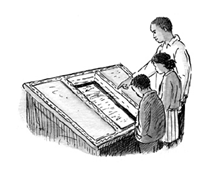
|
|
Saving the National Treasures
|

|
|
Program Overview
|

|
 NOVA traces the history of the nation's Charters of
Freedom—the Constitution, the Bill of Rights, and the
Declaration of Independence—and documents the five-year, $5
million design and construction of the new encasements that will
house them.
NOVA traces the history of the nation's Charters of
Freedom—the Constitution, the Bill of Rights, and the
Declaration of Independence—and documents the five-year, $5
million design and construction of the new encasements that will
house them.
The program:
-
reports on how the original sealed glass cases were constructed
in the early 1950s and expected to last indefinitely.
-
notes that only 50 years later conservators began questioning
the condition of the original housing when microscopic analysis
revealed deterioration of the glass.
-
reviews the team of physicists, chemists, engineers, and
conservators who were assembled to determine the best type of
new encasements.
-
recounts how the Declaration of Independence came to be made and
details its contents and travels during the Revolutionary War.
-
relates how parchment is made from animal skin and how
ultraviolet rays, oxygen, and fluctuations in humidity can
adversely affect it.
-
details each part of the new encasement prototype and reports on
controversies that arose during its design.
-
explains that the original document may have been subjected to
water when an engraving was made of it and to sun exposure when
it resided at the former Patent Office.
reviews how the document's iron gall ink was made. -
details how the Declaration of Independence, a document written
as a declaration of war against England, evolved during its
200-year history into a ringing declaration of equality for all.
-
features the removal of the documents from their original cases
and notes the three-year process in which the documents were
examined and photographed.
-
notes that conservators performed limited and reversible
restoration to the documents prior to their re-encasement and
display at the National Archives Building in Washington, D.C.
Taping Rights: Can be used up to one year after the program
is taped off the air.
|

|
